
By Michał, April 25, 2024 · 16 min read
How to Start an Online Store in Poland: A Step-by-Step E-commerce Guide
Explore the Polish E-Commerce Landscape
Analyzing the Polish e-commerce market, it's evident that Poland stands as a leading force in the Central and Eastern Europe (CEE) and South Eastern Europe (SEE) region, accounting for a significant proportion of total e-commerce expenditure. This dynamic market represents nearly half (46.2%) of the e-commerce spending in the CEE & SEE zone, positioning it as a powerhouse in digital commerce.
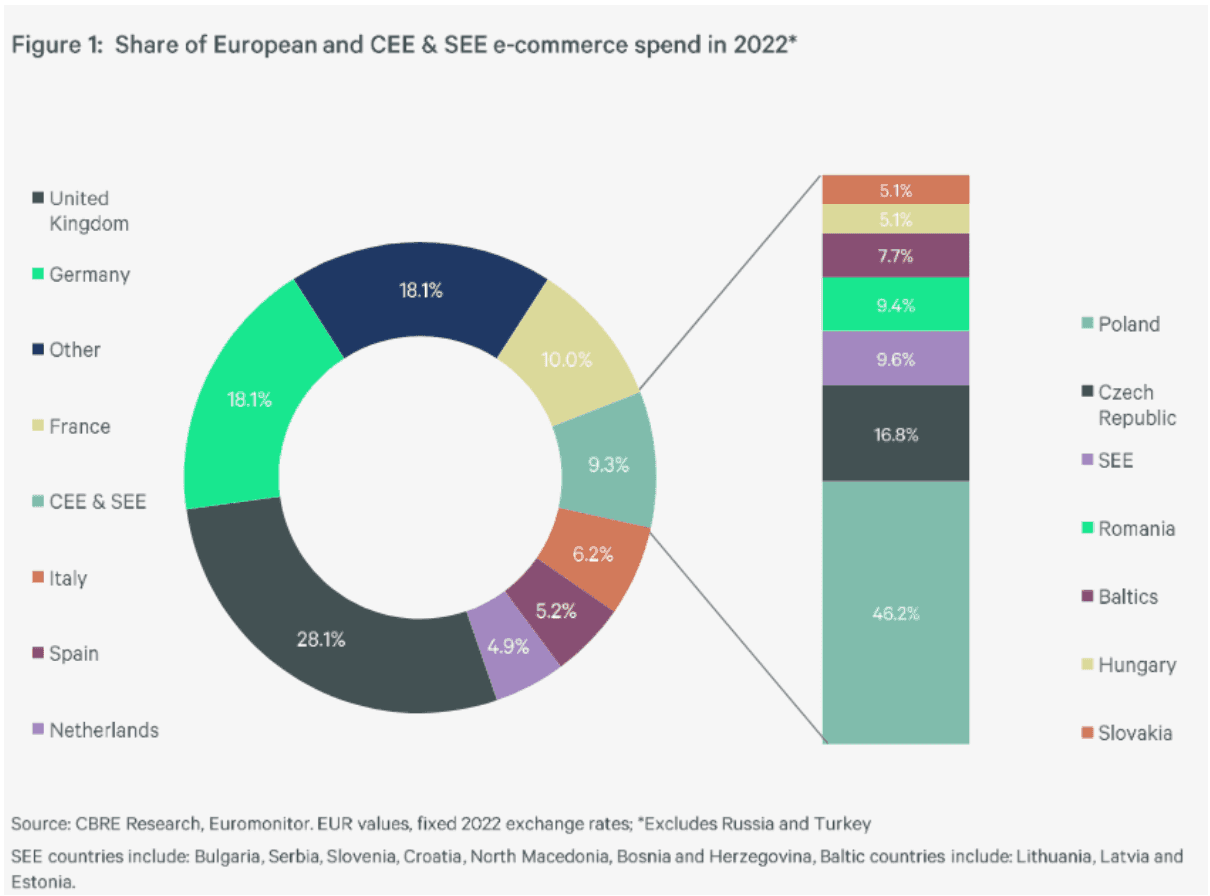
Key Statistics:
- As of the end of 2022, Poland's population stood at ~ 37 mln
- In 2022, 88% of this population were internet users, with 73% (an average of 76% in EU) engaging in online shopping. This translates to approximately 20 mln (only some group of age is being calculated) as potential online buyers
- Poland is recognized as the second fastest-growing online market in Europe, following Portugal, highlighting significant opportunities for new businesses.
- By October 2023, online sales represented around 9% of total retail sales in Poland. The average monthly online spending per consumer was 573 PLN (about 133 EUR) (source: Gemius E-commerce Report 2023).
- Projections from Statista suggest a promising growth trajectory, with the online sales market expected to expand from $11.72 billion in 2023 to $20.46 billion by 2029 - a nearly 75% increase over 6 years.
Current E-commerce Market Trends:
- As of 2023, there were approximately 60,000 online stores in Poland, with projections indicating this number could rise to 110,000 by 2029. 53% of this growth, predominantly driven by sectors such as fashion, electronics and health.
- 79% of online users (aged 7-75) in Poland make purchases online.
- Of these, 75% order exclusively from Polish websites, while 30% place orders on foreign sites, only 19% of purchases are made through social media platforms.
Source: Gemius Ecommerce Report 2023 // Eurostat/Statista // Strategy& Polska
These insights are crucial for anyone looking to start an online store in Poland, providing a robust foundation for understanding market dynamics and consumer behaviors.
Explore E-commerce Market Shares in Poland's Online Sector: A Comprehensive Overview of Market Distribution
The Polish online e-commerce market was predominantly split into two main sectors. Approximately 55% of the market share was held by independent online shops, while 45% was under the control of marketplaces (According to a 2021 study by Statedy & Poland). Allegro emerged as the leading marketplace, dominating this segment. The expected trend is a further increase in the marketplace's market share, reflecting similar shifts observed in the offline retail sector where supermarkets and discount stores have gradually overshadowed local shops. The growing preference for marketplaces is attributed to their competitive pricing - owing to multiple sellers offering the same products - and generally superior customer service, enforced by strict standards that sellers must meet to maintain high ratings and competitiveness.
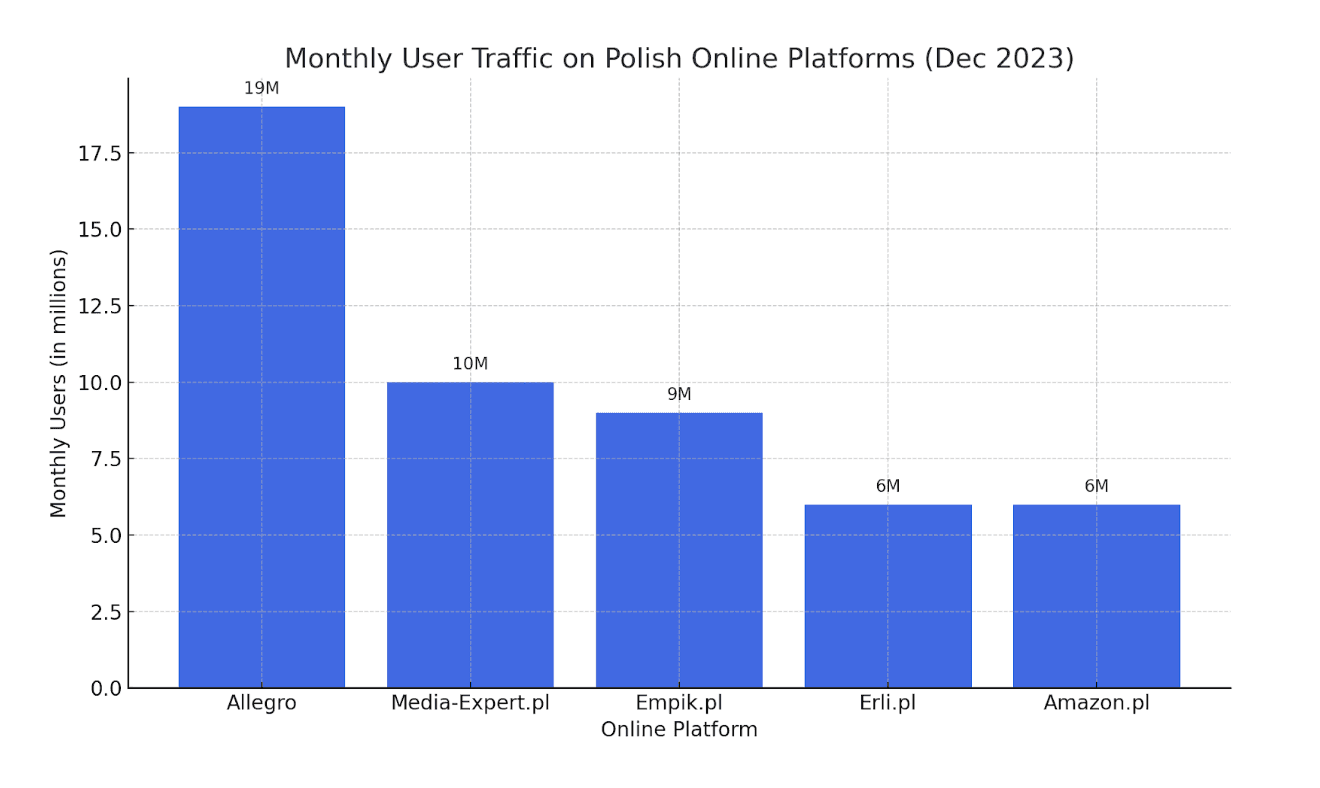
Dominant E-commerce Sales Channels in Poland
- Allegro.pl: As the leading platform, holds about 30-50% of the entire online retail market in Poland and also operates in the Czech Republic and Slovakia. In some categories, Allegro's market dominance reaches up to 90%. Monthly Traffic: Allegro garners around 19 million users monthly. Amazon.pl attracts 6 million users monthly. Media-Expert.pl, Poland's largest retailer of household appliances and electronics, records 10 million users monthly (source: Gemius/Media Panel - December 2023).
Other Significant Online Platforms:
-
Empik.com -> Empik-place ( Marketplace): Transformation: From Online Store to Marketplace: Hosts over 9 million users monthly across various product types, including books, fashion, sports, electronics, and home & garden items more information can found here.
-
Erli.pl: platform has over 6 million monthly users. One of the fastest-growing marketplace platforms in Europe, with a GMV growth rate exceeding 130% year-on-year, and it is the largest of its kind in Poland, solely owned by Polish capital. Currently, the platform hosts over 21,000 Polish vendors offering more than 17 million products.
Price Comparison Sites
(Source: Gemius 2023)
- Ceneo.pl: Leads with over 17 million users per month.
- Skapiec.pl
- Okazje.info.pl - Nokaut.pl: Attracts less than 1 million users per month.
Visibility and Integration Strategies for New Entrants
To achieve visibility in the Polish market, listing your products on at least one price comparison site is essential, depending on your product range. It's important to verify if your online store can generate XML files that meet the integration requirements of these platforms. Alternatively, you may need to develop a plugin to export such XML files from your system.
Should you require assistance with implementing the XML file into your online store, feel free to contact us at Hatimeria. We specialize in preparing online systems for the Polish market, ensuring that your store is fully equipped to handle the demands of selling in this region.
Shipping and Payment Integrations for Starting an E-commerce Online Business in Poland
In the Polish e-commerce market, delivery to parcel machines is the preferred shipping method, where customers can pick up their orders at any time. Remarkably, 82% of online buyers opt for this method, with 93% of them choosing Paczkomat® InPost as their preferred service—making it the most popular. The second most favored service is Orlen Paczka, chosen by 23% of consumers. While other options like DPD Pickup (15%) and DHL POP (9%) exist, focusing on the top two can suffice for most businesses.
(According to the Gemius E-commerce Report 2023)
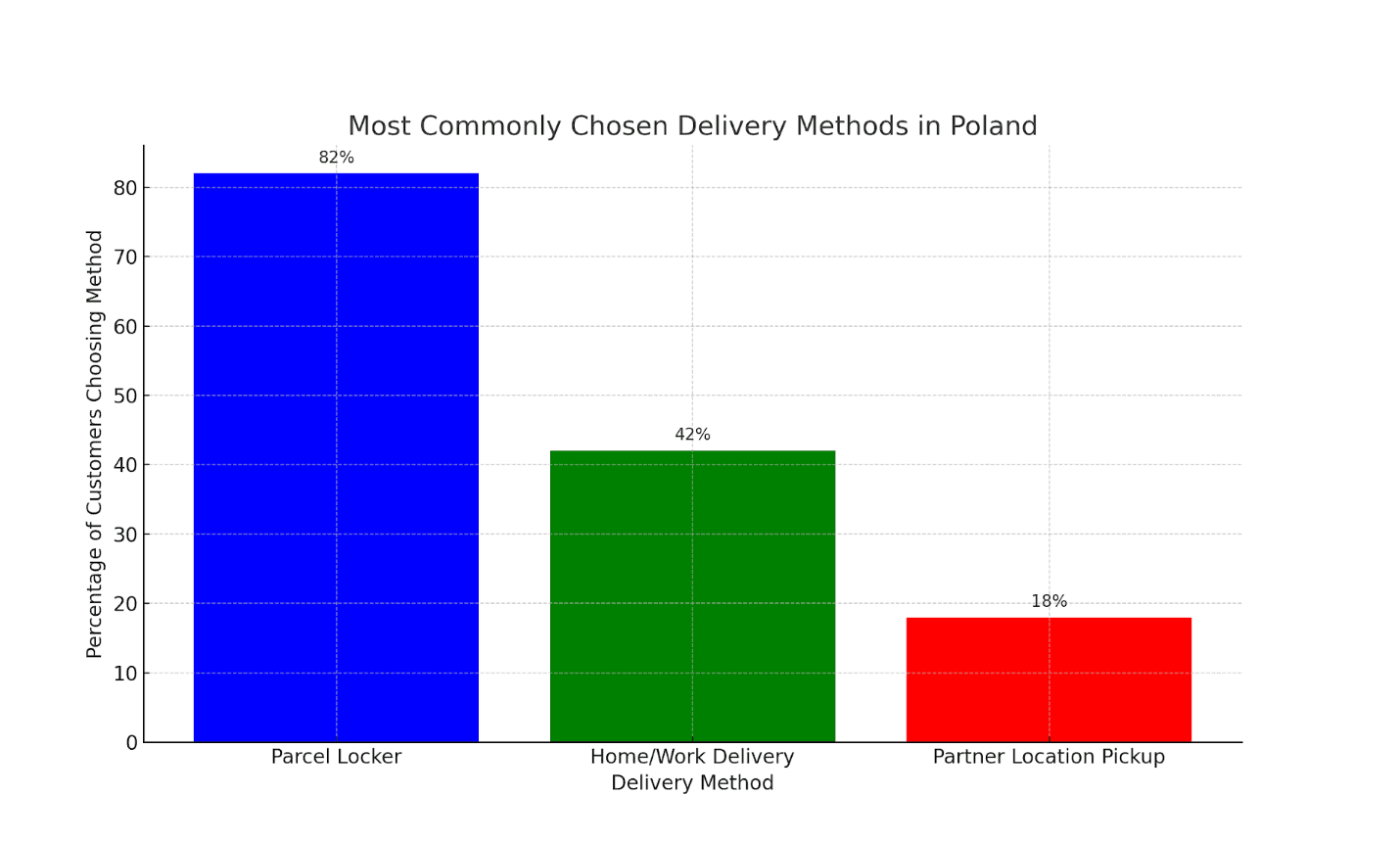
How It Works:
On your online store, customers should be able to choose their preferred delivery to a parcel machine directly from a map at the cart checkout page. It’s important to implement an interactive map on your site that lists available machines, which must be updated daily to reflect real-time availability.
Home and Workplace Deliveries:
While less popular than parcel machines, delivering to home or workplace remains significant, with 42% of buyers opting for this. This becomes especially relevant for parcels exceeding the dimensions of 41 cm x 38 cm x 64 cm, which is the maximum size for the commonly used parcel lockers.
Popular Courier Companies Chosen by Customers in Poland:
(According to the Gemius E-commerce Report 2023)
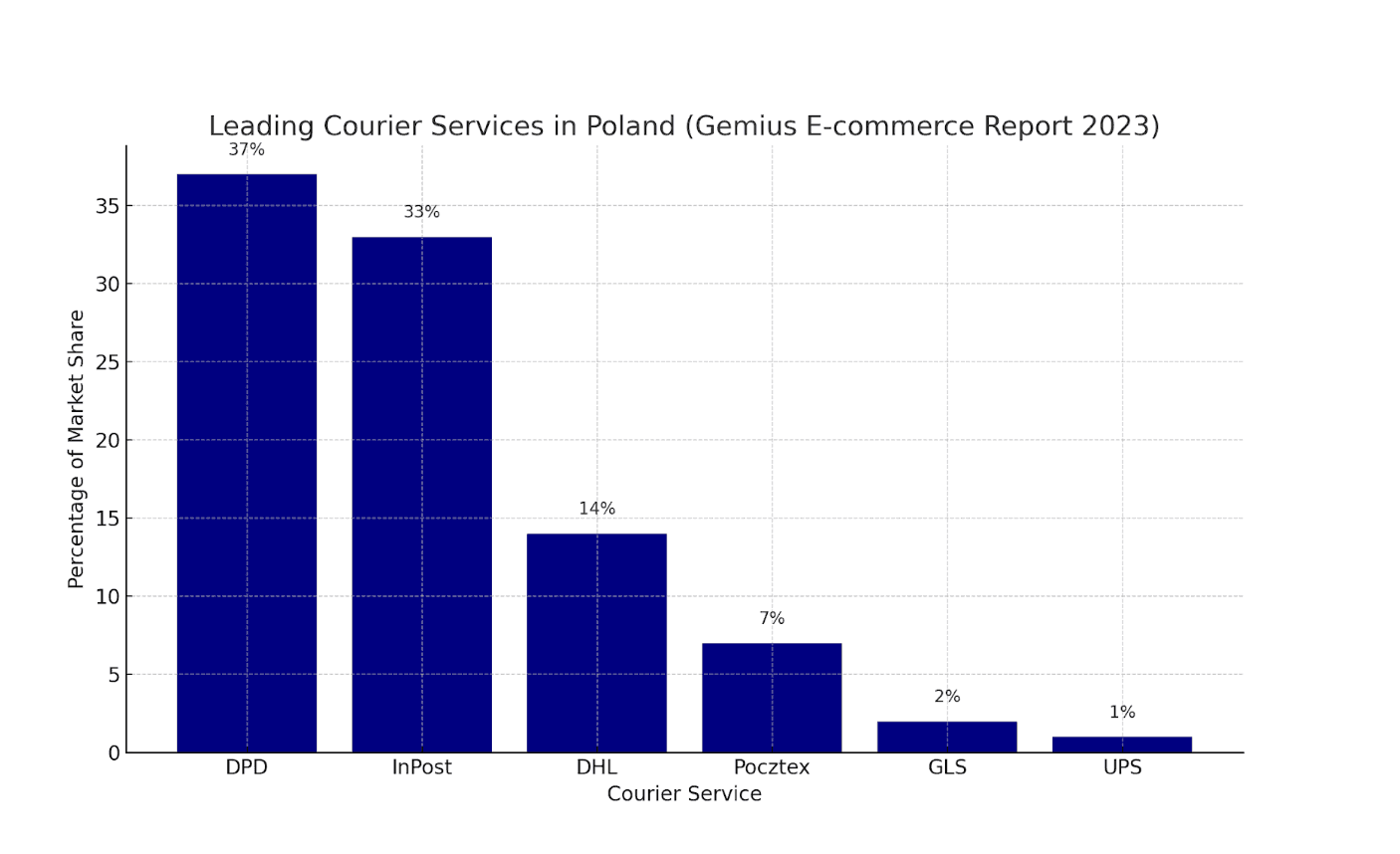
Managing Courier Services and Marketplaces Integration
For businesses that do not have direct integrations with marketplaces or are looking to cut initial costs, using a linker tool is a viable solution. These tools connect your online store with multiple marketplaces both in Poland and abroad.
Recommended Linker Tools:
BASELINKER is highly recommended due to its extensive integration capabilities. Alternatives like SELLASSIST and APILO are available, though they may offer fewer integration options. Using such a linker tool ensures your product prices and quantities are always updated on platforms like Allegro, and also facilitates the printing of shipping labels from local couriers. Most linkers are compatible with both local and international e-commerce systems like Shopify, Magento, PrestaShop, and WooCommerce.
Should you encounter any issues with integration, or if your specific e-commerce platform is not supported, Hatimeria is available to assist you (contact us here). We can develop the necessary integrations to ensure your online store is fully equipped to meet the demands of selling in Poland.
Essential Payment Methods for Polish Customers
When setting up an online store targeting the Polish market, it is crucial to offer payment methods beyond just card payments or standard bank transfers, as these might not meet the preferences of local consumers.
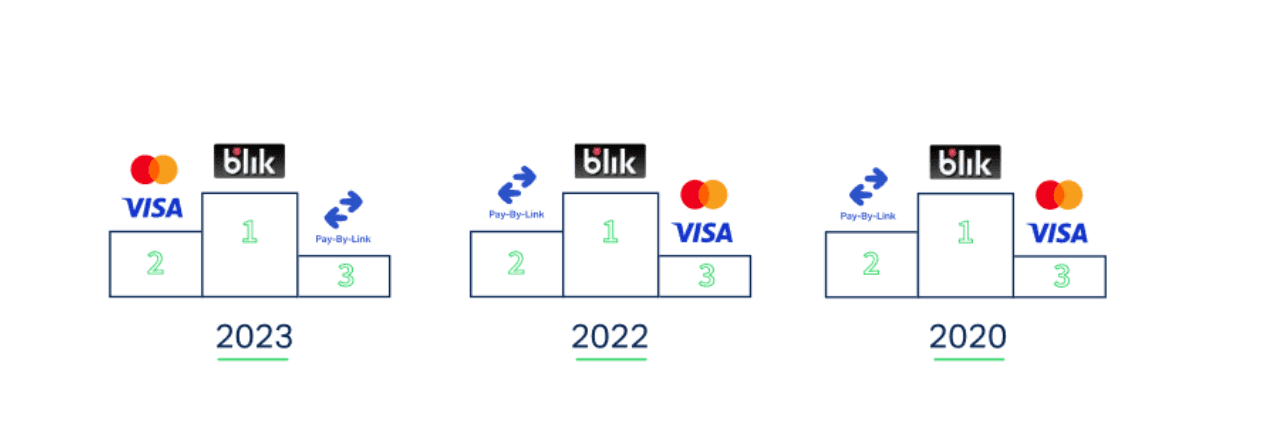
Source: Tpay.com report from 2023, the top three most popular payment methods among Polish consumers
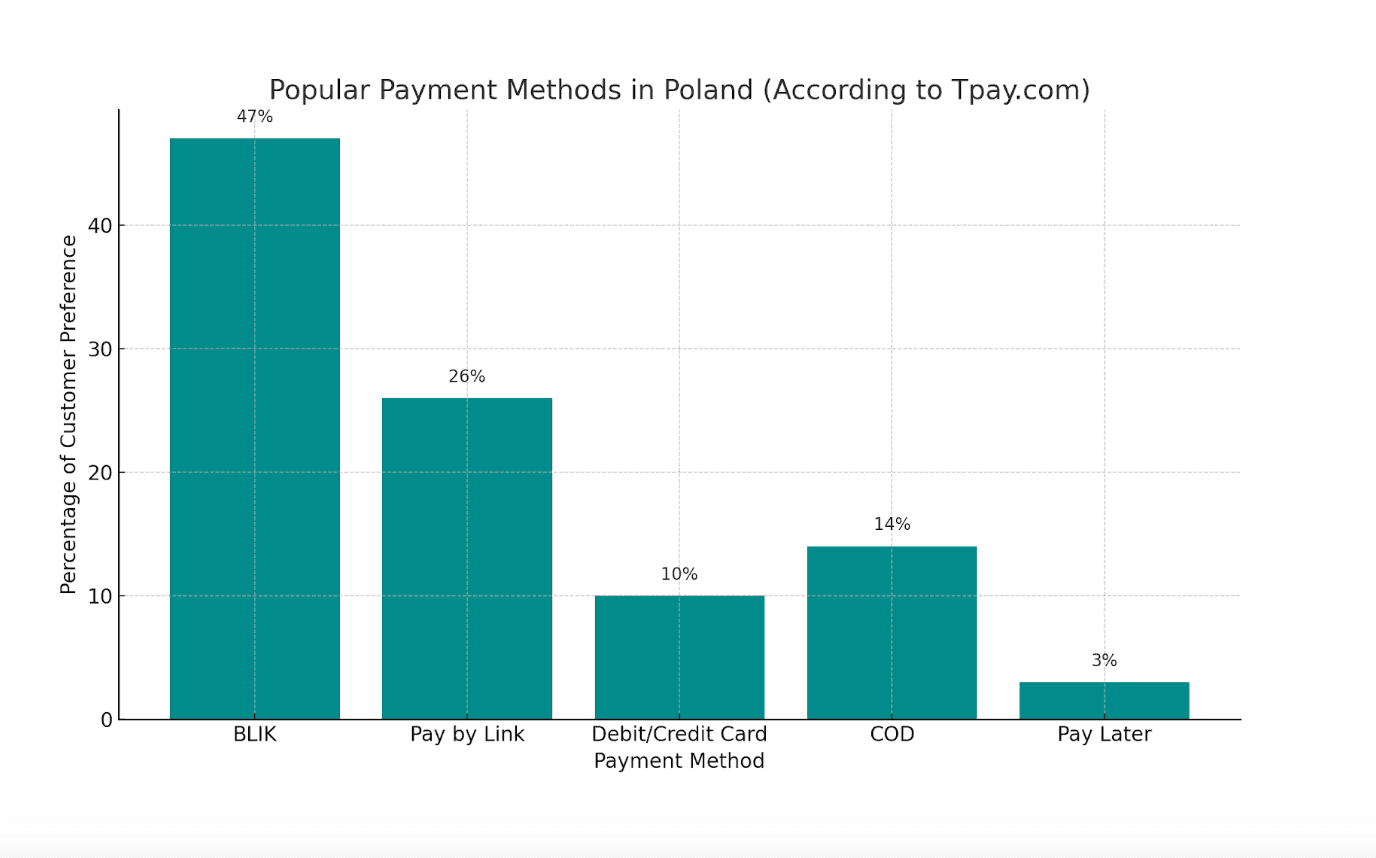
Popular Payment Methods in Poland:
-
BLIK (47%): This is the most popular payment method, chosen by 47% of Polish customers over the past three years according to a Tpay.com report. BLIK is a unique, Polish-developed payment solution that is expanding to other Eastern European countries. It allows customers to generate a 6-digit code via their mobile banking app, enter it on the online store's payment page, and confirm the transaction on their app—providing a fast and secure way to pay without needing to log into a bank account or enter card details. The shop receives payment confirmation within seconds.
-
Pay by Link (26%): This method redirects customers to their online banking interface immediately after placing an order, facilitating a direct bank transfer without manually entering payment details.
-
Debit/Credit Card Payments (10%): Despite being less favored, credit and debit card payments remain an essential option for some customers.
-
Cash on Delivery (COD): This includes both cash and card payments made to the courier or at certain parcel machines, offering flexibility for customers who prefer to pay upon receipt.
-
Pay Later Payments (3%): This emerging option allows customers to defer payment and is typically integrated with several online payment operators.
Integrating Payment Solutions:
Fortunately, integrating these payment methods does not require separate setups for each. Leading online payment operators in Poland, such as Przelewy24.pl (which holds a 60% market share), Tpay.com or PayU, already include BLIK, card payments, and pay-by-link options in their services. By partnering with one of these operators and implementing their solutions in your online store, you can offer the top three payment methods preferred by Polish customers all at once.
This approach not only simplifies the payment process for your customers but also ensures that your online store meets local payment preferences, which is crucial for success in the Polish e-commerce market. VAT and OSS in Poland for Online International Sales
VAT and OSS in Poland for Online International Sales
If you're involved in international online sales, you're likely familiar with the VAT OSS (One-Stop Shop) scheme. This system simplifies the VAT obligations for businesses selling goods and services across EU borders. Here’s what you need to know about VAT rates in Poland:
- Standard VAT Rate: In Poland, the standard VAT rate is 23%. This rate applies to most goods and services provided within the country.
- Reduced VAT Rates 8%, 5%, 0%: Poland also offers reduced VAT rates for specific categories of goods and services. However, these reduced rates can vary, and it's essential to verify the applicability of these rates to your specific products.
8% Reduced VAT Rate:
- This rate is applicable to services and goods in specific sectors, such as:
- Construction services that are part of social housing programs.
- Services related to culture, sports, and recreation.
5% Reduced VAT Rate:
- This lower rate covers essential consumer goods, including:
- Basic food products such as bread and dairy.
- Baby products.
- Books and e-books, promoting accessibility to education and reading.
0% Preferential VAT Rate:
- This rate is applied under special circumstances to encourage certain economic activities:
- Intra-community supply of goods between EU member states.
- Export of goods to non-EU countries.
Vat rate taxes validated 04.2024
Cost-Effective E-commerce Strategies for Gathering Customer Reviews When Selling Online in Poland
When launching an online store in Poland, collecting customer reviews is crucial for building trust and enhancing your store's credibility. Here’s how you can approach it effectively while managing costs:
Free Tools for Gathering Reviews:
Utilizing free tools can be a smart way to start collecting customer reviews without incurring additional costs. These tools typically provide basic functionalities, which might be sufficient in the early stages of your business:
- Google Customer Reviews: This service helps gather post-purchase feedback directly through Google, which can boost your store's visibility and credibility on the platform.
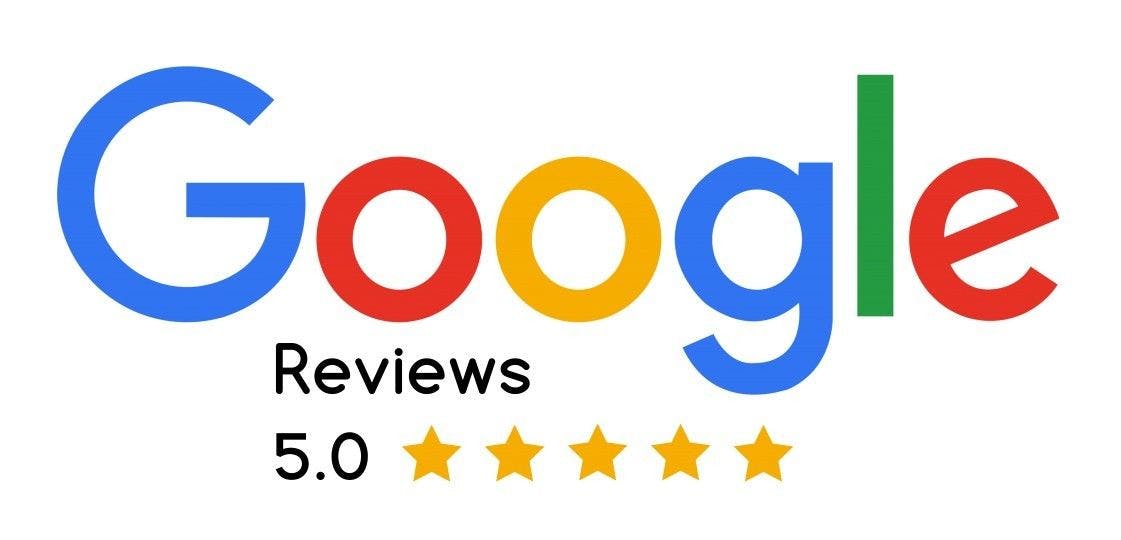
- ZAUFANE OPINIE from CENEO: This is another excellent free* option, especially useful for integrating with price comparison websites popular in Poland, allowing customers to leave reviews that help others make informed purchasing decisions.
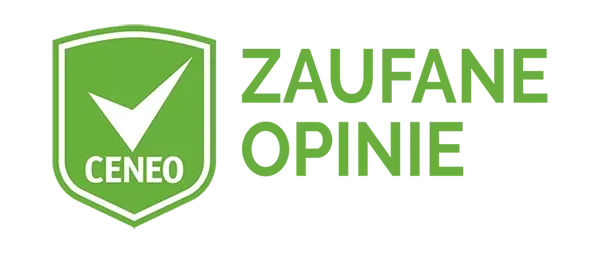
Using these free services allows you to start building a base of customer reviews and gain insights into your customers' experiences without any financial investment.
*(It’s free but your products must be visible at Ceneo so you will have to pay some cpc fees)
Paid Review Management Services:
As your business grows and your needs evolve, you might find that the functionalities offered by free tools are no longer sufficient. In such cases, considering a paid service can be beneficial:
- Advanced Features: Paid platforms often offer more than just basic review gathering; they provide tools for analyzing review data, displaying reviews more attractively, and even managing negative feedback effectively.
- Product-Specific Reviews: If you want to highlight reviews for specific products, paid services can facilitate this by allowing more detailed reviews and ratings, which can directly influence purchasing decisions and improve product visibility.
- Increased Engagement: Some paid services offer features that encourage more customers to leave reviews, such as reminders and incentives, which can significantly increase the number of reviews you collect.
Choosing the Right Option:
- Assess Your Needs: Consider what is most important for your business at its current stage. If you are just starting and need to build credibility, a free tool might suffice. However, if you are scaling up and need more sophisticated features, a paid service might be more appropriate.
By carefully considering your needs and the available options, you can effectively use customer reviews to boost your online presence and sales in Poland.
E-commerce Marketing in Poland
When considering e-commerce marketing strategies, it's important to recognize Google's dominance in the Polish market, holding 96% of the search engine market share as of 2022. Bing has 3%, and other search engines share the remaining 1% (Eurostat/Statista). While focusing your advertising efforts on Google can be highly effective due to its vast reach, this also means facing stiff competition, necessitating a higher investment in both time and resources. Diversifying your marketing efforts across different channels can help mitigate risks and maximize your visibility across the online landscape.
Implementing Regulation Terms, Conditions, and Privacy Policy for the Polish Market
If you are either planning to launch or are already operating an online store targeting Polish customers, it's critical to ensure that your terms and conditions, as well as your privacy and cookie policies, comply with Polish legal standards. Not having the correct documentation not only risks non-compliance with local laws but can also affect customer trust and your store's legitimacy.
Importance of Local Legal Compliance
- Consumer Protection: Polish law has specific requirements designed to protect consumers, especially in the online marketplace. This includes clear communication of terms of service, return and refund policies, and comprehensive privacy policies detailing the use and protection of user data.
- Data Protection: Following the GDPR and local data protection laws is crucial. Your privacy policy should detail how you collect, use, and protect your customers' personal information, including how cookies are used on your site.
Recommended Resources for Legal Compliance
To ensure your terms and conditions are up to standard, consider using local legal services that specialize in e-commerce and understand the intricacies of Polish law. Here are two recommended services:
-
Rzetelny Regulamin: They offer services to create bespoke terms and conditions tailored to your specific business needs. They also provide evaluations of your online store to ensure compliance with Polish law.
-
Prokonsumencki: This service also specializes in drafting consumer-friendly legal documents for online businesses and can help ensure that your policies are up to date and legally sound.
By partnering with Prokonsumencki and Rzetelny Regulamin or any such services like them, you ensure that your online store's terms and conditions remain up-to-date throughout the duration of your cooperation. These services not only draft and revise legal documents tailored to your specific business needs but also provide ongoing updates. They actively monitor changes in the law and will inform you of any upcoming regulations that might affect your operation. This proactive approach helps you maintain compliance and stay ahead of legal requirements, securing your store’s integrity and customer trust.
Starting Your Online Store in Poland: A Comprehensive E-commerce Guide
If you're aiming to establish a robust online presence in Poland, here are essential steps to prepare your online store for success:
-
Translation Of Your System: Ensure your e-commerce system interface is fully translated into Polish. Consult with a local e-commerce manager who is well-versed in the Polish market and language to review all translations, especially the call-to-action buttons.
-
Product Descriptions: You can use ChatGPT to translate and recreate your product descriptions in Polish. Avoid direct translation tools. Instead, provide the original description, and request a new, optimized version with bullet points highlighting why you recommend the product. Always focus on SEO optimization for better visibility.
-
Legal Compliance: Implement regulation terms, conditions, privacy policy, and cookie policy. These documents must be compliant with Polish law and readily accessible on your website.
-
Additional Information Pages: Add pages that detail warranty, returns, shipping, and payment information. These pages should provide clear and comprehensive information to help customers make informed decisions.
-
Shipping Solutions: Implement popular local shipping options such as InPost Paczkomaty and Orlen Paczka. Choose the service that best fits your logistics strategy and customer preferences.
-
Payment Integration: Partner with a payment operator. Note that these providers will require your site to have all legal and informational pages in Polish before approval.
-
Marketplace Sales: Consider selling on established marketplaces to increase your reach and credibility among Polish customers.
-
Marketing Strategy: Launch marketing campaigns using Google Ads, Facebook Ads, Instagram, and Bing Ads to drive traffic and sales.
-
Affiliate Programs: Start an affiliate program to leverage networks of bloggers, influencers, and other websites to promote your store.
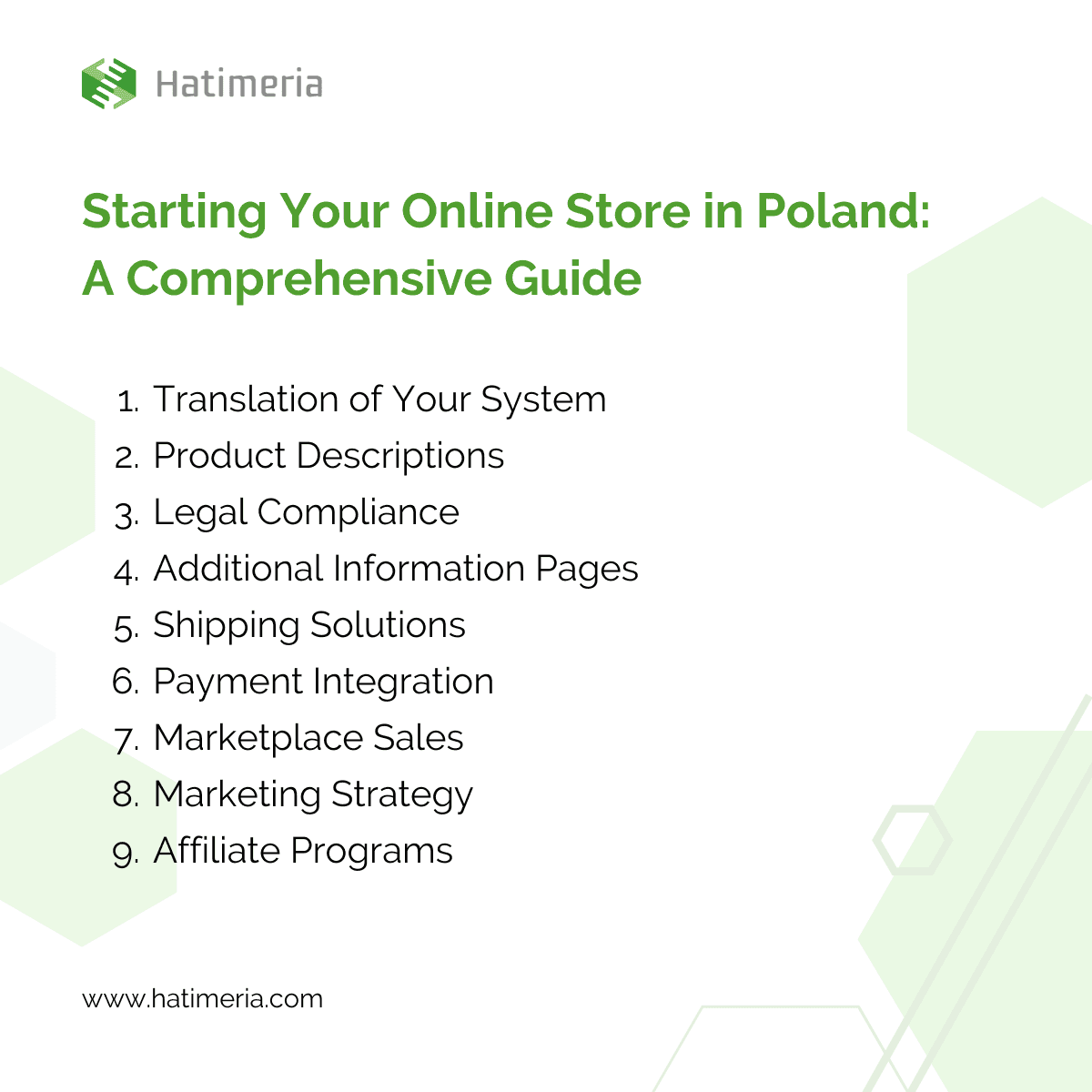
Available Assistance
If you're new to the Polish e-commerce landscape, Hatimeria can provide comprehensive support and project management. Whether you need full-time oversight or hourly guidance, I can help streamline your setup and optimize your e-commerce processes. With nearly two decades of experience in the industry, I have tackled numerous challenges and collaborated extensively with IT professionals to develop and refine e-commerce solutions.
About Me: I've been immersed in the e-commerce business since 2003, managing my own online store for almost 20 years. My experience includes crafting integration strategies with various ERP systems and linkers, testing workflows, and enhancing system functionality.
Contact us to learn more
Would you like to innovate your ecommerce project with Hatimeria?

For 20 years, he has been deeply involved in e-commerce, managing projects and helping businesses succeed on platforms like Shopify, Magento, AtomStore, and Baselinker. As a consultant, he has assisted companies entering Poland's e-commerce market. He also owns Mikesport, a respected brand he founded, known for quality and innovation in e-commerce.
Read more Michał's articles



